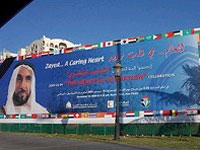Masdar -- The New World Centre for Renewable Energy
 It has been called an ’Enviro-Utopia’, a ’Mirage in the Desert’, an Entrepreneurial Eco-system,’ the ’Mecca of Renewable Energy’, the world’s first ’Zero Carbon, Zero Waste City’, the ’City of the Tomorrow’ - and it’s not even been built.
It has been called an ’Enviro-Utopia’, a ’Mirage in the Desert’, an Entrepreneurial Eco-system,’ the ’Mecca of Renewable Energy’, the world’s first ’Zero Carbon, Zero Waste City’, the ’City of the Tomorrow’ - and it’s not even been built.The multibillion-dollar Masdar Initiative, which was launched only a year ago, is a combination clean-tech investment fund, property developer and renewable-energy start-up, all dedicated to preparing Abu Dhabi for the end of oil and positioning it as the global leader in green energy and sustainable living.
This month will see groundbreaking for the six-square-kilometre, $22 billion project that its backers say will be the world’s first zero-pollution carbon-neutral urban center. Masdar (which means “the source” in Arabic), will be capable of housing 47,500 people, some of whom will take up residence this year. Construction is expected to take 10 years.

The only component of this visionary new city where construction has actually begun is the solar power plant that will provide energy to the Masdar Institute, the project’s headquarters which will open in late 2009. The solar plant will provide the energy required to build the rest of the city. In typical Abu Dhabi fashion, it will be the largest grid-connected solar plant in the Middle East. Solar energy is something Abu Dhabi has in great abundance.
The Masdar City master plan melds centuries-old principles of traditional Arabic urban planning and architecture with leading-edge technologies designed to create a sustainable, high-quality living environment for all residents.
The City will be built in seven carefully designed phases, incorporating the latest technological advances generated in its clean-tech cluster and globally. No cars will be allowed in the city. People will get around through an electric light-rail system that will be linked to the center of Abu Dhabi, the capital of the United Arab Emirates.A desalination facility will be 80 percent more efficient than existing plants, and all wastewater will be purified and recycled to grow plants that could be used for biofuels.
Masdar will be the home of the Masdar Institute of Science and Technology, which backers hope will attract some of the best academics from the around the world. Also envisioned are research and development facilities from multinational companies and start-ups in the clean technology area. Masdar is seeking to become the world headquarters of the newly launched International Renewable Energy Agency (IRENA).

Last month the city hosted the second annual World Future Energy Summit (WFES), a gathering of clean-tech companies from around the world at an event the New York Times dubs as the “Davos gathering on renewable energy”.
And while much of the rest of the world is using the financial crisis as an excuse to put off the transition to cleaner power, at the WFES’s opening session Abu Dhabi pledged 7% of its energy would come from renewable sources by 2020, up from nothing today.

“This is really a very powerful image,” says Rajendra Pachauri, the chair of the U.N.’s Intergovernmental Panel on Climate Change, one of the summit’s A-list attendees quoted in a Time Magazine article. “It clearly shows that a country that has no immediate economic need to diversify its energy production is willing and able to do so.”
To demonstrate its willingness to work globally last month Abu Dhabi’s high-profile Masdar clean tech investment fund signed agreements with partners around the world, including:
- The Seychelles government to invest in wind energy, solar energy and waste-to-energy technologies across the island state;
- The Nigerian National Petroleum Corporation (NNPC), to reduce gas flaring and promote energy efficiency in Nigeria through projects that will again apply for UN Clean Development Mechanism (CDM) certification;
- With GE to strengthen its ecomagination initiative by building a research centre in Masdar City;
- With Australia’s new Carbon Capture and Storage Institute as a founding member; and
- via the Masdar Institute of Science and Technology with the Massachusetts Institute of Technology Energy Initiative (MITEI).
Masdar has an ’Open Door’ policy for more partnerships.
But while deal making of this order of magnitude is impressive in terms of solidifying Abu Dhabi’s leadership in renewable energy technology development and deployment, what will capture the most attention over the next decade will be the sheer audacity of the vision and the architectural genius of the urban experiment that will become Masdar City.

Ahmed Ali Al Sayegh, Chairman of The Masdar Initiative notes the long-term aim of the Initiative is to create a broad range of innovative industries that will generate a steady flow of new ideas and technologies and advances.

“Firmly networked into the global economy, these industries will transform Abu Dhabi’s economic role and will contribute to the development of national and regional economies. When that is accomplished, Abu Dhabi will then have completed its transition from a 20th Century, carbon-based economy into a sustainable 21st Century high-technology economy.”
For more information on the development please visit http://www.masdaruae.com/For More Information: World Future Energy Summit
Source 2: Greenbiz
You can return to the main Market News page, or press the Back button on your browser.

